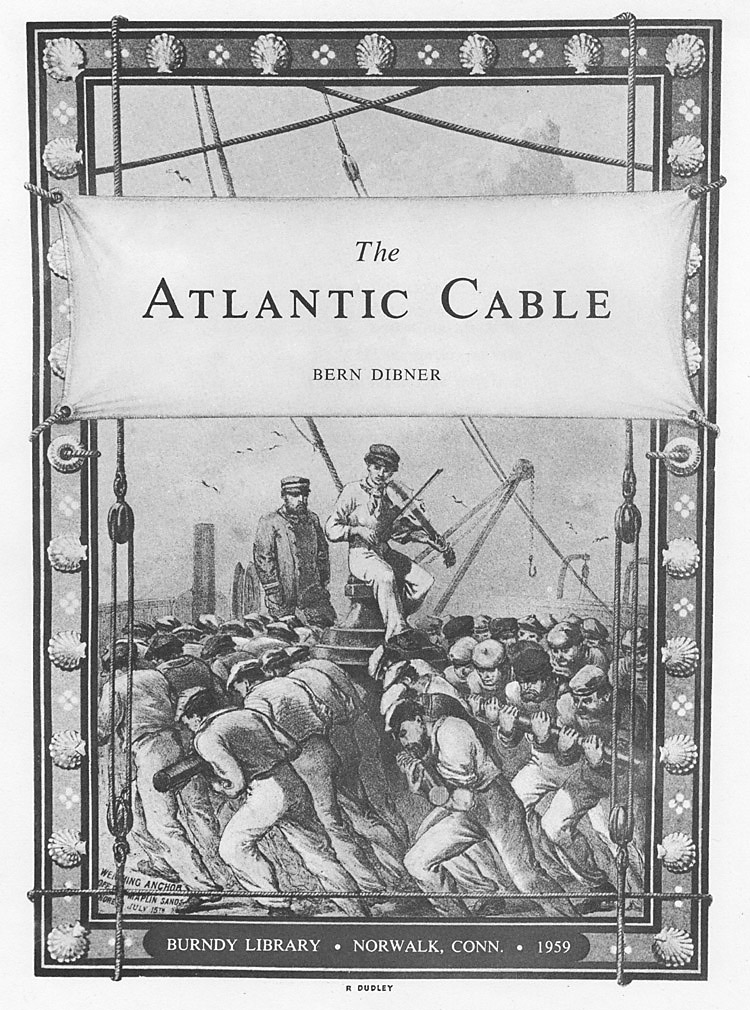Bern Dibner: The Atlantic Cable (1959)
Filed under book | Tags: · history of science, history of technology, science, technology, telegraphy

“Bern Dibner wrote a lucid chronological history of the laying of the Atlantic Cable. He covers the early experiments of Morse in New York Harbor in 1842; Ezra Cornell’s laying of a line across the Hudson River in 1845; the five actual attempts at laying the cable; and the eventual success in completing two telegraph circuits connecting Newfoundland and Ireland in 1866.
Cyrus Field was, in the words of William Thomson (later Lord Kelvin), the “originator and mainspring” of the project, which was regarded as foolhardy in many quarters. At the outset in 1854, Field realized that many electrical, mechanical, oceanographical, and nautical problems would have to be solved. Having sought and obtained encouragement of specialists in each of these areas, he was able to raise the necessary capital to finance the design, manufacture, transportation, and laying of the submarine telegraph cable. Field did not foresee, however, that the enterprise would take twelve years and forty long, hazardous trans-Atlantic crossings (the first by sailing vessel); that it woudl touch the fields of science, politics, finance, and geography; and that it would cost $12,000,000.
This book makes clear the roles of Field and Morse and Thomson, of the ships’ captains and the financial backers, and of all those who played a part in the courageous undertaking.” (source)
Publisher Burndy Library, Norwalk/Connecticut, 1959
96 pages
via Smithsonian Libraries
Videos about the transatlantic telegraph cable (via Marcell Mars):
The Great Transatlantic Cable (PBS, 120 min), torrent
Modern Marvels S01E06 – Transatlantic Cable (44 min)
History Detectives – Transatlantic Cable (PBS, 16 min)
PDF (no OCR)
Comment (0)Richard Sennett: The Craftsman (2008)
Filed under book | Tags: · craft, hand, history, labour, machine, technology, work

“Craftsmanship, says Richard Sennett, names the basic human impulse to do a job well for its own sake, and good craftsmanship involves developing skills and focusing on the work rather than ourselves. The computer programmer, the doctor, the artist, and even the parent and citizen all engage in a craftsman’s work. In this thought-provoking book, Sennett explores the work of craftsmen past and present, identifies deep connections between material consciousness and ethical values, and challenges received ideas about what constitutes good work in today’s world.
The Craftsman engages the many dimensions of skill—from the technical demands to the obsessive energy required to do good work. Craftsmanship leads Sennett across time and space, from ancient Roman brickmakers to Renaissance goldsmiths to the printing presses of Enlightenment Paris and the factories of industrial London; in the modern world he explores what experiences of good work are shared by computer programmers, nurses and doctors, musicians, glassblowers, and cooks. Unique in the scope of his thinking, Sennett expands previous notions of crafts and craftsmen and apprises us of the surprising extent to which we can learn about ourselves through the labor of making physical things.”
Publisher Yale University Press, New Haven and London, 2008
ISBN 0300149557, 9780300149555
326 pages
review (Lewis Hyde, The New York Times: Sunday Book Review)
review (Fiona MacCarthy, The Guardian)
Gilbert Simondon: Being and Technology (2012)
Filed under book | Tags: · ontology, philosophy, philosophy of technology, technical object, technology, transduction, transindividual

“The first sustained exploration of Simondon’s work to be published in English.
This collection of essays, including one by Simondon himself, outlines the central tenets of Simondon’s thought, the implication of his thought for numerous disciplines and his relationship to other thinkers such as Heidegger, Deleuze and Canguilhem.
Complete with a contextualising introduction and a glossary of technical terms, it offers an entry point to this important thinker and will appeal to people working in philosophy, philosophy of science, media studies, social theory and political philosophy.
Gilbert Simondon’s work has recently come to prominence in America and around the Anglophone world, having been of great importance in France for many years.”
Contributors: Miguel de Beistegui, Elizabeth Grosz, Anne Sauvagnargues, Bernard Stiegler, Igor Krtolica, Jean-Hugues Barthélémy, Yves Michaud, Sean Bowden, Dominique Lecourt, and the editors.
Edited by Arne De Boever, Alex Murray, Jon Roffe, Ashley Woodward
Publisher Edinburgh University Press, 2012
ISBN 074864525X, 9780748645251
236 pages
via lastobserver
review (Wil Kaiser, H-Net Reviews)
Comments (3)
